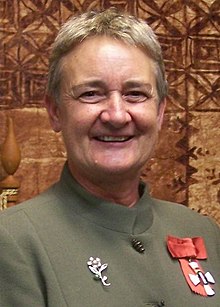
Back مارلين ويرينغ Arabic مارلين ويرينج ARZ Marilyn Waring AST Marilyn Waring Catalan Marilyn Waring Welsh Marilyn Waring Danish Marilyn Waring German Marilyn Waring Spanish Marilyn Waring Basque Marilyn Waring Finnish
Dame Marilyn Waring | |
|---|---|
 Waring in 2008 | |
| Member of the New Zealand Parliament for Raglan | |
| In office 29 November 1975 – 25 November 1978 | |
| Preceded by | Douglas Carter |
| Succeeded by | Electorate abolished |
| Member of the New Zealand Parliament for Waipa | |
| In office 25 November 1978 – 14 July 1984 | |
| Preceded by | Electorate re-established |
| Succeeded by | Katherine O'Regan |
| Chair of the Public Expenditure Committee | |
| In office 1978–1984 | |
| Board member of the Reserve Bank of New Zealand | |
| In office 2005–2009 | |
| Personal details | |
| Born | 7 October 1952 Ngāruawāhia, New Zealand |
| Political party | National (1974–1984) |
| Committees |
|
| Website | www |
Dame Marilyn Joy Waring DNZM (born 7 October 1952) is a New Zealand public policy scholar, international development consultant, former politician, environmentalist, feminist and a principal founder of feminist economics.
In 1975, aged 23, she became New Zealand's youngest member of parliament for the centre-right New Zealand National Party. As a member of parliament she chaired the Public Expenditure Committee. Her support of the opposition Labour Party's proposed nuclear-free New Zealand policy was instrumental in precipitating the 1984 New Zealand general election, and she left parliament in 1984.
On leaving parliament she moved into academia; she is best known for her 1988 book If Women Counted, and she obtained a D.Phil in politics in 1989. Through her research and writing she is known as the principal founder of the discipline of feminist economics. Since 2006, Waring has been a professor of public policy at the Institute of Public Policy at AUT, focusing on governance and public policy, political economy, gender analysis, and human rights. She has taken part in international aid work and served as a consultant to UNDP and other international organisations.
She has outspokenly criticised the concept of gross domestic product (GDP), the economic measure that became a foundation of the United Nations System of National Accounts (UNSNA) following World War II. She criticises a system which "counts oil spills and wars as contributors to economic growth, while child-rearing and housekeeping are deemed valueless".[1][2] Her work has influenced academics, government accounting in a number of countries, and United Nations policies. Waring has had a long-time involvement with the Association for Women's Rights in Development, a progressive feminist organisation that advocates inclusive feminism, and served on its board until 2012.[3] In 2021 she was appointed by the World Health Organization as a member of the WHO Council on the Economics of Health For All.[4]
- ^ Bjørnholt, Margunn (2010). "Waring, Marilyn". In Andrea O'Reilly (ed.). Encyclopedia of Motherhood. Thousand Oaks, CA: SAGE Publications. pp. 1260–1261. ISBN 978-1-4129-6846-1.
- ^ Fischlin, Daniel; Nandorfy, Martha (2007). The Concise Guide to Global Human Rights. Black Rose Books. ISBN 978-1-55164-294-9.
- ^ "Biography: Dr. Marilyn Waring". Retrieved 6 May 2022.
- ^ "Global experts of new WHO Council on the Economics of Health For All announced". World Health Organization. Retrieved 12 May 2021.